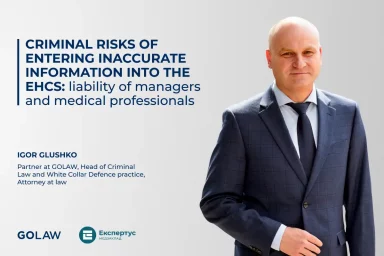Will business owners be personally liable for their companies in Ukraine?
Contents
Business owners got used to the idea that the legal entity shields them from personal liability for activities of their companies. Indeed, the rule is that company’s assets and liabilities are separate from those of shareholders’, thus limiting personal liability to the invested capital. However, is this rule an absolute one?
The case law of European countries shows that exceptions are possible. In some circumstances, courts may interpret the actions of a company as actions of its owners, in other words may “pierce the corporate vail” protecting owners from personal liability.
The case law in Ukraine has been silent on the matter until recently. The Supreme Court of Ukraine in July 1, 2020 took first steps towards practical application of doctrine of “piercing the corporate vail” (case № 910/15925/18). Should investors be worried? The answer lies in origin of doctrine and perspective of Ukrainian law.
What does it mean to “pierce the corporate vail”?
The doctrine of “piercing the corporate vail” is familiar to businesses operating in the common law system, particularly in the UK. The doctrine roots in the courts’ decisions that separate personality of a company, i.e. the “corporate veil”, sometimes can be disregarded or, in other words, be “pierced”.
The principles behind a company with limited liability are illustrated perfectly in the court’s decision in Salomon v Salomon & Co in England. It has affirmed that assets, rights and liabilities of a company and a shareholder are separate from each other, even if a shareholder controls a business, receives all the profit and is the director of a company. Shortly after Salomon case, some entrepreneurs have started using companies to avoid their personal liabilities. For example, shareholders have used companies to circumvent non-solicitation agreements (Gilford Motor Co Ltd v Horne) or to avoid selling the property under their personal contract (Jones v Lipman).
The courts saw that in some cases a company became a mere sham or façade for shareholders to breach their personal obligations. Hence, courts have bound companies to perform personal obligations of their shareholders. That was the inception of the doctrine.
The doctrine is also used in legal proceedings, when determining who can sue if the damage is done to the company. Could it be a company itself or its shareholders? Again, the rule is that proper claimant is a company through its director or liquidator. However, there are exceptions: shareholders can sue when their personal rights as shareholders have been violated (Edwards v Halliwell). For example, the governance rights, rights to dividends or claims against unscrupulous directors.
Why business cares?
In the UK, the creditors are particularly interested in the successful application of the doctrine. Typical case is a creditor providing the loan or facility to a company, which then defaults and has no assets to satisfy any claim. Creditor then tries to issue proceedings against other solvent companies within the group, parent company with deeper pockets or even ultimate beneficiary owner (VTB Capital Plc v Nutritek International Corp & Ors). In other cases, creditors try to attribute liability of subsidiaries for damages to the parent company, whereas under the law creditors had legal relations only with subsidiaries (Adams v Cape Industries Plc).
Although common law has the record of successful application of the doctrine, it is far from being conclusive (Antonio Gramsci Shipping Corp v Stepanovs). In many landmark cases creditors failed to convince the court to apply the doctrine.
Case for application of doctrine in Ukraine
In Ukraine, the civil law has codified the provision that a shareholder is not liable for company’s obligations and vice versa, except otherwise provided in the articles of association or other laws. Thus, there is not much prospect of Ukrainian courts holding liable shareholders of Ukrainian companies for personal obligations.
On the other hand, shareholders may stand a chance to protect their interests in court in some circumstances. In general, Ukrainian courts do not recognize the shareholders’ right to represent the interests of a company in court, unless articles of association provide such right or a company issued a power of attorney. Shareholders can also sue on behalf of the company in a derivative claim for recovery of damage done to the company by its officers (decision of the Supreme Court of Ukraine in case No. 904/4669/18).
The decision of the Supreme Court of Ukraine adopted in July 01, 2020 clarifies circumstances, in which shareholders can sue and protect their interests (case No. 910/15925/18). In this case, one shareholder successfully petitioned lower court to declare resolution of general meeting void. The other shareholder has been appointed as the board member by the same resolution, so he decided to appeal. In the meantime, company has been liquidated. The court of appeal barred second shareholder from appeal, because the proper claimant representing a company in liquidation should have been a liquidator.
The Supreme Court of Ukraine disagreed and confirmed the second shareholder had the right to appeal. The court pointed out that shareholders, whose personal rights were violated, and the company itself can dispute the resolution of general meeting. Declaring the resolution void, the lower court decided on shareholder’s personal rights. Furthermore, by the time second shareholder filed the appeal, company had been liquidated, so the company itself could not file the appeal to protect rights of second shareholder.
The Supreme Court of Ukraine came to conclusion that because company could not file the appeal through its directors or liquidator, the shareholder had the right to do so. The court also referred in its rationale to Agrotexim and Others v. Greece, thecase with a few similar circumstances decided byEuropean court of human rights.
Therefore, the Supreme Court of Ukraine decided there was exceptional circumstances and courts should “pierce the corporate vail” and allow shareholders to protect their interests in court when the company can not.
How application of doctrine affects businesses in Ukraine?
The practical application of doctrine in Ukraine is limited. The creditors will not be able to “pierce corporate vail” and advance claims for assets of defaulted company’s owners. In absence of such practice, businesses, banks and credit institutions in particular, should conduct thorough legal due diligence of its clients and partners as well as their affiliates. In addition, creditors should conclude contracts for security interest with ultimate beneficiary owners, thus ensuring their companies would perform their obligations.
The recent case of the Supreme Court of Ukraine is more concerned with application of the doctrine in the legal proceedings, but is important for its future use in Ukraine. The doctrine could be used for protection of violated shareholders’ rights when the dividends are not duly paid, majority shareholder uses company’s funds in personal interests or when directors breach their duties. Defining the circumstances in which the doctrine can be used will provide effective tools for creditors to protect their interests against unscrupulous debtors and abuse of company’s separate legal personality.
Sign up to be aware
New achievements are inspired by information. GO further, don’t miss out GOLAW news and legal alerts
Our expertise
-
- Energy and Natural Resources
- Antitrust and Competition
- Banking and Finance
- Compliance, Corporate Governance and Risk Management
- Corporate and M&A
- Criminal and White Collar Defence
- Defense in Anti-corruption procedures and regulations
- Digital Economy Practice
- Labor and Employment
- Natural Resources and Environment
- Government Relations (GR)
- Insolvency and Corporate Recovery
- Intellectual property
- International trade
- Legal support of business and private Сlients in Germany
- Litigation and dispute resolution
- Private clients
- Real Estate and Construction
- Restructuring, Claims and Recoveries
- Martial Law
- Tax and Customs
-
- Agribusiness
- Aviation
- Chemical industry
- Engineering, Construction and Building Materials
- Environment and Natural Resources
- Financial institutions
- IT and AI
- Industry and manufacturing
- Healthcare industries, Life sciences and Pharmaceuticals
- Media, Entertainment, Sports and Gambling
- Retail, FMCG and E-Commerce
- Transport and Logistics
We use cookies to improve performance of our website and your user experience.
Cookies policy
Cookies settings







